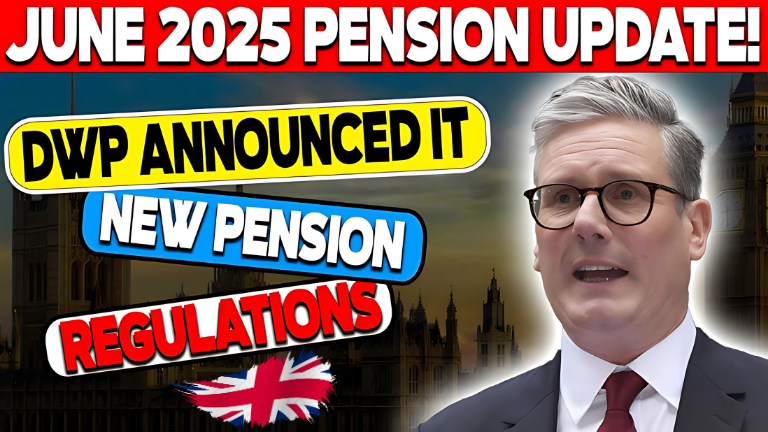Getting your benefits on time is crucial for managing your monthly budget and expenses. Understanding when your DWP payments will arrive in June 2025 helps you plan ahead and avoid financial stress during the month.
The Department for Work and Pensions follows specific payment schedules that can vary depending on weekends and bank holidays. Many people worry when their payments seem delayed, but there are usually simple explanations for any timing changes you might notice.
How DWP Payment Dates Work in June 2025
Your benefit payment dates follow a predictable pattern throughout the year, but June 2025 has some specific considerations. When your usual payment date falls on a weekend or bank holiday, the DWP automatically moves it to the previous working day.
This system ensures you never have to wait longer than expected for your money. The automated payment system processes thousands of transactions daily, so small delays can sometimes occur due to banking procedures.
Weekend and Bank Holiday Payment Rules
Planning around weekends becomes easier when you understand the DWP’s approach to timing. If your normal payment day is Saturday or Sunday, you’ll receive your money on the Friday before instead.
Bank holidays work the same way, with payments arriving on the last working day before the holiday. This forward payment system protects you from unnecessary delays during these periods.
How Banking Systems Affect Your Payments
Different banks process BACS payments at various times throughout the day and night. Some people receive their benefits at midnight, while others might wait until early morning for the funds to appear.
Don’t panic if your payment doesn’t arrive at exactly the same time as last month. Banking systems can have minor variations that affect when money appears in your account, even when the DWP sends it at the same time.
State Pension Payment Schedule for June 2025
State pension payments follow a completely different system based on your National Insurance number. The last two digits of your NI number determine which day of the week you receive your pension money.
This system spreads payments across the working week to reduce pressure on the banking system. Your pension payment day remains consistent throughout the year, making it easier to budget and plan expenses.
National Insurance Number Payment Days
Understanding your NI number schedule helps you know exactly when to expect your pension. Numbers ending 00-19 receive payments on Monday, while 20-39 get theirs on Tuesday.
Wednesday payments go to those with numbers ending 40-59, Thursday covers 60-79, and Friday handles 80-99. This system has worked effectively for years and rarely changes.
First Pension Payments and Timing
New pensioners can choose when they want their first payment to begin after making their claim. The DWP guarantees your initial payment will arrive within five weeks of your chosen start date.
Early payments sometimes occur if your selected payment day falls on a bank holiday. The system automatically adjusts to ensure you receive your money as quickly as possible without delays.
What to Do When Payments Don’t Arrive
Missing payments cause immediate stress, but there are logical steps to resolve most issues quickly. Start by checking your awards notice to confirm the exact payment date you should expect.
Remember that bank holidays and weekends can push payments to different days. Your money might be waiting in the banking system, even if it hasn’t appeared in your account yet.
Checking with Your Bank First
Contact your bank’s customer service before calling the DWP about missing payments. Sometimes funds are pending in the system and just need a few more hours to process completely.
Banks can see incoming payments before they appear in your account balance. This information helps determine whether the delay is on the banking side or requires DWP intervention.
When to Contact DWP Offices
After confirming with your bank, it’s time to reach out to the relevant government department. Universal Credit claimants can use their online account or call the helpline at 0800 328 5644.
PIP payment issues require calling the PIP enquiry line at 0800 121 4433. Tax credits and other HMRC-handled benefits need different contact methods through their dedicated support channels.
2025 Benefits Increases and Implementation
Benefits increased by 1.7% in April 2025, but many people haven’t seen the higher amounts yet. Universal Credit claimants might not receive increased payments until June due to assessment period calculations.
The new rates only apply from your first complete assessment period beginning on or after April 7th. This timing difference explains why some people are still waiting for their increased benefit amounts.
Universal Credit Assessment Periods
Your assessment period runs for one complete calendar month, with payment arriving about a week later. If your period started before April 7th, you’ll wait until the next full cycle for increased payments.
This system means some claimants won’t see higher amounts until June 2025. The delay is temporary, and you’ll receive any back-payments owed from the April increase date.
State Pension Increases Under Triple Lock
State pension rose by 4.1% in April 2025 following the triple lock system. This increase came from wage growth being the highest of the three factors considered.
The full new flat-rate pension now pays £230.25 weekly for those reaching pension age after April 2016. These increases took effect immediately when the new tax year began on April 6th.
Determining Your Benefit Eligibility in June 2025
Benefit eligibility covers a wide range of circumstances including unemployment, disability, parenting, and age-related needs. Multiple online calculators help determine what support you might qualify for.
Professional advice services like Citizens Advice provide personalized guidance about available financial support. These services understand complex eligibility rules and can identify benefits you might not know about.
Using Online Benefit Calculators
Turn2Us, Policy in Practice, and EntitledTo offer comprehensive benefit calculators. These tools ask detailed questions about your situation and suggest appropriate claims to consider.
Calculator results give you a starting point for understanding potential entitlements. However, speaking with advisers provides more detailed guidance about the application process and supporting evidence needed.
Government Support Programs Available
The Help for Households website explains various government support schemes beyond standard benefits. These programs target specific costs like energy bills, housing, and childcare expenses.
Local councils often run additional support schemes funded by government grants. These might include emergency payments, food vouchers, or help with essential household items.
Understanding Payment Timing and Bank Processing
Payment timing varies significantly between different banks and their processing systems. The DWP uses BACS (Bankers’ Automated Clearing Services) for most benefit payments, which typically processes overnight.
Most people receive their benefit payments between midnight and early morning hours. However, some banks take longer to make these funds available in customer accounts.
Why Payment Times Vary
Banking infrastructure differences affect when money appears in your account after the DWP sends it. Larger banks often have faster processing, while smaller institutions might take additional time.
Automated systems occasionally experience minor delays or technical issues. These usually resolve within a few hours and don’t indicate problems with your benefit claim.
Upcoming DWP Changes and Reforms
The DWP has announced significant changes to the benefits system coming in future years. Positive changes include increasing Universal Credit for single people aged 25 and over by £7 weekly from 2026-2027.
New right to try work provisions will let people test employment without immediately losing benefit entitlement. Enhanced employment support aims to help more claimants find sustainable work opportunities.
Disability Benefit Modifications
PIP eligibility criteria will become stricter under proposed changes currently under consultation. The Universal Credit health element faces a freeze and potential cuts for new claimants.
These changes remain under review through the DWP consultation process. The public can submit responses and opinions about proposed modifications until the consultation closes.
How to Participate in Consultations
The Pathways to Work consultation allows public input on benefit system reforms. You can respond online through the government consultation website or submit written responses.
Email responses go to [email protected], while written submissions should be sent to the Disability and Health Support Directorate in London.
Cost of Living Support Beyond Standard Benefits
No cost of living payments are planned for 2025, with the last payments distributed in February 2024. However, alternative support remains available through various channels and organizations.
Charitable grants provide targeted help for specific groups including bereaved, disabled, unemployed, or elderly individuals. These grants often cover expenses that standard benefits don’t address adequately.
Local Council Support Schemes
Local councils operate various support schemes funded by government grants and local resources. These might include debt advice, furniture assistance, and emergency food support.
Crisis support schemes help with immediate financial emergencies. Many councils also distribute fuel vouchers and food bank referrals for residents experiencing hardship.
Food Banks and Emergency Support
Trussell Trust food banks operate across the UK, providing emergency food supplies to families in crisis. Their website helps locate your nearest food bank and explains the referral process.
IFAN member organizations offer additional food support networks. These independent food banks often have different referral systems and might be more accessible in rural areas.
Frequently Asked Questions
Q: What if my benefit payment is late? Check your awards notice first, then contact your bank to ask about pending payments before calling the DWP.
Q: When will I see the 2025 benefit increases? Universal Credit increases might not appear until June 2025 due to assessment period timing, while state pension increases started in April.
Q: How do I know which day my state pension arrives? Your National Insurance number’s last two digits determine your payment day – check the schedule above for your specific day.
Q: Can I work while receiving benefits? New “right to try” rules will allow work trials without immediate benefit loss, but current rules vary by benefit type.
Q: What support exists without cost of living payments? Charitable grants, local council schemes, food banks, and various government support programs remain available.
Q: How do I apply for additional support? Use online benefit calculators, contact Citizens Advice, or speak with your local council about available assistance programs.
Q: Why do payment times vary between banks? Different banks process BACS payments at various speeds, with most completing transactions between midnight and early morning.
Q: What changes are coming to disability benefits? PIP eligibility may become stricter, and Universal Credit health elements face potential cuts – these remain under consultation.
The benefits system continues evolving to meet changing needs while maintaining support for those who need it most. Staying informed about payment schedules and available support helps you navigate the system more effectively throughout 2025.

